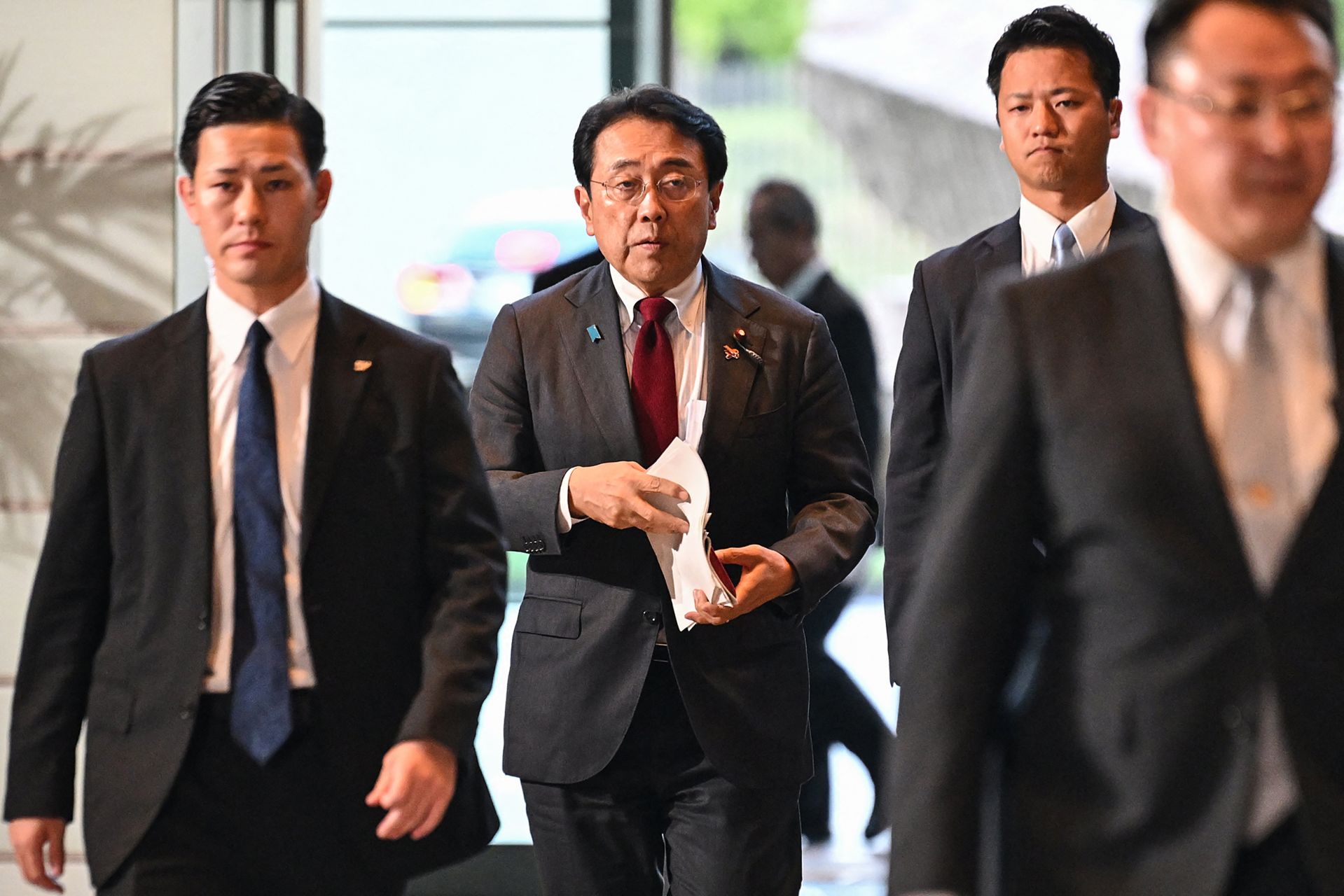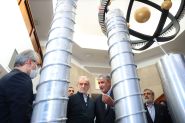- Home
- Middle East
- Trump to Meet Japan Envoy for Tariff Negotiations

Japan's incoming minister in charge of economic security, Ryosei Akazawa (2nd L), arriving at the prime minister's office in Tokyo. Economic Revitalisation Minister Ryosei Akazawa, Japan's envoy for upcoming tariff talks, will depart for Washington to meet senior US officials on April 16, 2025, the government confirmed. Japan has not escaped President Donald Trump's tariff blitz despite the close strategic and economic ally being the biggest investor into the US. ( ©Yuichi YAMAZAKI / AFP
US President Donald Trump said he will join negotiations on Wednesday with Japan's envoy for tariffs, after both countries expressed confidence in striking a mutually beneficial outcome.
Trump issued a 90-day pause last week on his 24-percent tariffs on Japan, the biggest investor into the United States and its close strategic and economic ally.
The White House meeting with Tokyo's envoy is being closely watched as a possible barometer for talks with other countries, as trade officials line up to negotiate over Trump's punishing tariffs.
"Japan is coming in today to negotiate Tariffs, the cost of military support, and 'TRADE FAIRNESS.' I will attend the meeting, along with Treasury & Commerce Secretaries," Trump posted on Truth Social. "Hopefully something can be worked out which is good (GREAT!) for Japan and the USA!"
As he left for the White House meeting, Japan's tariff talks envoy Ryosei Akazawa likewise spoke of seeking a "win-win" outcome, while protecting Japanese national interests.
"I am confident that we will be able to build a relationship of trust and conduct good negotiations that will lead to a win-win relationship," Akazawa, Japan's economic revitalization minister, told reporters.
Trump has imposed steep levies on imports of Japanese cars, steel and aluminum.
Automaker Honda said on Wednesday it will shift production of its hybrid Civic model from Japan to the United States in June or July, but stopped short of saying the reason was US tariffs.
The rationale behind the decision "is not a single issue", a Honda spokesperson. "The decision is based on the company's policy since its foundation that we produce cars where the demand is."
The vehicle, however, represents only a small part of the Japanese company's annual output.
Akazawa will also hold talks with Treasury Secretary Scott Bessent and Trade Representative Jamieson Greer during his trip.
Purchases of US defense hardware and natural gas from Alaska could be up for negotiation, analysts said.
The minister, who studied at a US university and is close to Prime Minister Shigeru Ishiba, said he wants to "protect our national interests" in talks with Bessent and Greer, who are "fond of Japan".
The Daiwa Institute of Research warned on Wednesday that Trump's reciprocal tariffs could cause a decline of 1.8 percent in Japan's real GDP by 2029.
US officials are also set to hold talks with South Korea and others, but Stephen Innes at SPI Asset Management called the discussions with Japan a "canary in the tariff coal mine".
"If Japan secures a deal -- even a half-baked one -- the template is set. If they walk away empty-handed, brace yourself. Other nations will start pricing in confrontation, not cooperation," he wrote in a newsletter.
And "don't forget the elephant in the vault: Japan's still the biggest holder of US Treasuries. And that, my friend, is a whole lot of leverage", he added.
Top Japanese officials including Ishiba have brushed aside claims that Tokyo may have deliberately created volatility in the US Treasury market to force Trump's pause of reciprocal tariffs, saying that is not what allies would do.
Ishiba held a telephone call Wednesday afternoon with Malaysia's Prime Minister Anwar Ibrahim and separately with France's President Emmanuel Macron to discuss the impact of US tariffs and China's retaliatory actions.
Ishiba told Anwar that "the current situation is serious for Japanese companies operating in Southeast Asian countries" and that he was willing to listen to the voices of Southeast Asian countries, according to the foreign ministry.
Macron and Ishiba also discussed the impact of the tit-for-tat US-China tariffs "on the global economy and the multilateral trade system," and "affirmed that it is in the common interest of Japan and France to maintain and strengthen a free and open international order based on the rule of law," the ministry said.
"We share the same vision of rules-based and mutually beneficial international trade," Macron posted on X.
With AFP
Read more



Comments